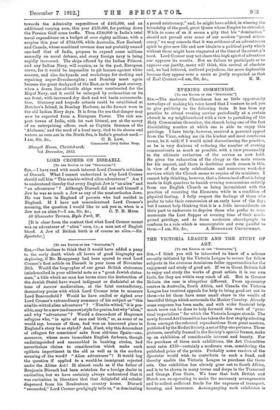[To um Enrron oi TKN " Erzoraron."] SIB,—One inclines to
think that it would have added a pang to the early death which all lovers of good biography are deploring, if Mr. Monypenny bad been spared to read Lord Cromer's first article on Disraeli in your issue of November 30th. Would the biographer of our great British statesman (misdescribed in your editorial note as a great Jewish states- man," a title which no man has borne since the destruction of the Jewish State) have waxed indignant or disdainful at the tone of narrow medievalism, at the faint contradictory, damnatory praise with which Lord Cromer tries to measure Lord Beaconsfield P Would he have smiled or sighed over Lord Cromer's extraordinary summary of his subject as "this nimble-witted alien adventurer" P "Nimble-witted," it is pos- sible, may be a new (and narrow) style for genius, but why "alien," and why "adventurer" P Would a descendant of Huguenot refugees who, "in spite of race and birth," or, as some of us would say, because of them, had won an honoured place in England's story be so styled P And, if not, why this descendant of refugees for conscience' sake from old-time Spain—one, moreover, whose more immediate English forbears, though undistinguished and unennobled in banking circles, had nevertheless claims to consideration which make such epithets impertinent in the old as well as in the modern meaning of the word P "Alien adventurer "1 It would beg the question if applied to a would-be immigrant rejected under the Aliens Act ! It almost reads as if the father of Benjamin Disraeli had been mistaken for a foreign dealer in curiosities, but we have certainly always understood that it was curiosities in literature that that delightful old scholar dispensed from his Bmdenham country house. Disraeli "succeeded," Lord Cromer grudgingly tells us, ‘'in dominating a proud aristocracy," and, he might have added, in winning the friendship of the good, great Queen whose Empire he extended. While to some of us it seems a pity that his " domination " should not prevail over some of our modern "proud aristo- cracy," we may concede that it was evidence of an adventurous spirit to give new life and new ideals to a political party which without these might have stagnated at the time of its countiy's need. Lord Cromer may not share this high spirit of adventure nor approve its results. But no failure to participate or to approve can justify, many will think, this revival of obsolete and, we had believed, outlived prejudices, the more deplorable because they appear over a name so justly respected as that of Earl Cromer.—I am, Sir, &c., K. M.






































































 Previous page
Previous page